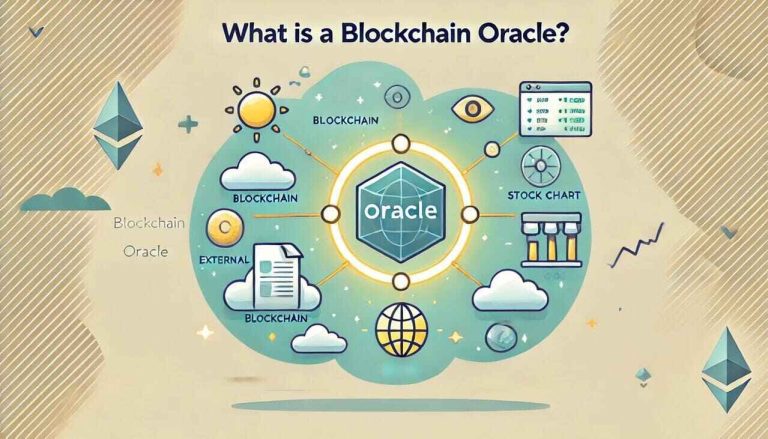Decentralized finance (DeFi) is transforming the financial system by removing intermediaries and enabling trustless transactions on blockchain networks. However, to function properly, DeFi applications need access to real-world information—something blockchains can’t inherently provide.
This is where blockchain oracles come in.
In this guide, we’ll answer the question, what is blockchain oracle? explore why oracles are essential for the growth of DeFi and highlight leading oracle networks like Chainlink and Band Protocol.
What Is a Blockchain Oracle?
A blockchain oracle is a third-party service that provides smart contracts with external (off-chain) data, enabling decentralized applications (dApps) to interact with the real world. Since blockchains are closed systems, they cannot access real-time data on their own. Oracles are bridges that connect the blockchain to external sources.
Oracles can supply various types of information:
- Cryptocurrency and stock prices
- Weather and sports results
- Economic data and interest rates
- Random number generation
- API feeds from web services
Without oracles, many DeFi functions—like lending, borrowing, derivatives, insurance, and stablecoins—would not be possible.
Why Are Blockchain Oracles Critical for DeFi?
DeFi relies on accurate, up-to-date data to function safely and fairly. Here’s why blockchain oracles are a cornerstone of the ecosystem:
1. Price Feeds for Financial Products
Protocols like Aave, Compound, and Synthetix need real-time asset prices to manage collateral, issue loans, and execute trades. Oracles deliver these prices securely and consistently.
2. Triggering Smart Contract Events
Insurance contracts need off-chain events (like flight delays or rainfall) to trigger payouts. Oracles bring this information on-chain.
3. Enabling Dynamic Interest Rates
Some DeFi platforms adjust interest rates based on real-world conditions like market volatility or liquidity—made possible by oracle data.
4. Providing Verifiable Randomness
Games, lotteries, and NFT minting events often use oracles to supply random values that cannot be manipulated.
In short, oracles empower DeFi with external data, making it smarter, more functional, and capable of interacting with global markets.
How Do Blockchain Oracles Work?
Oracles collect off-chain data from multiple sources and transmit it to smart contracts on-chain. The process typically involves:
- Data Aggregation: Pulling information from multiple sources to ensure accuracy.
- Validation: Using consensus mechanisms or multiple nodes to verify the data.
- Transmission: Relaying the data to the blockchain, where it can be used by smart contracts.
To minimize the risk of manipulation, many protocols use decentralized oracle networks (DONs) that aggregate data from multiple nodes.
Top Blockchain Oracle Projects to Explore
Let’s take a closer look at two of the most established oracle networks in the space.
1. Chainlink (LINK)
Chainlink is the leading decentralized oracle network and the most widely adopted in DeFi. It provides tamper-proof data feeds to hundreds of dApps across blockchains like Ethereum, BNB Chain, Avalanche, and Polygon.
Key Features:
- Decentralized network of independent node operators
- A wide range of data feeds, from crypto prices to weather and FX rates
- Verifiable Random Function (VRF) for provably fair randomness
- Cross-chain interoperability via CCIP (Cross-Chain Interoperability Protocol)
2. Band Protocol (BAND)
Band Protocol is another decentralized oracle network that focuses on scalability and speed. Built on the Cosmos SDK, Band delivers fast, low-cost data feeds to multiple blockchains.
Key Features:
- Operates on its blockchain, reducing congestion and fees
- Integrates easily with Cosmos-based projects
- Emphasizes real-time data availability for dApps
- Designed for high-frequency use cases like gaming and prediction markets
What Makes a Good Oracle?
When evaluating an oracle solution, developers and DeFi platforms consider:
- Decentralization: Are the data sources and delivery mechanisms trustless?
- Security: Can the oracle resist manipulation or false reporting?
- Latency: How quickly does the oracle deliver fresh data?
- Coverage: Does it provide a wide range of data types and sources?
- Interoperability: Can it serve data across multiple blockchains?
A robust oracle must check all these boxes to ensure the safety and efficiency of the DeFi protocols it supports.
Why “Blockchain Oracle” Is a Growing Search Trend
With the rise of smart contracts, more users are searching terms like what is blockchain oracle to understand how DeFi functions in the real world. Oracles provide the backbone for countless use cases—from decentralized insurance to synthetic assets—and their relevance will only grow in 2025 and beyond.
Final Thoughts: Why Blockchain Oracles Matter
Understanding what blockchain oracle is is essential for anyone exploring the world of DeFi. As the demand for accurate, real-time data grows, Oracle will continue to shape the future of decentralized applications.
Leading solutions like Chainlink and Band Protocol are pushing the boundaries of what’s possible in Web3, connecting on-chain smart contracts with off-chain data and services.
If you’re building or investing in DeFi, oracles aren’t just useful—they’re essential.
Looking to optimize your DeFi strategies?
Use platforms like Coinrule to automate your trades with real-time price feeds powered by leading oracle networks. Automate smarter, trade better.
Follow Our Official Social Channels:
